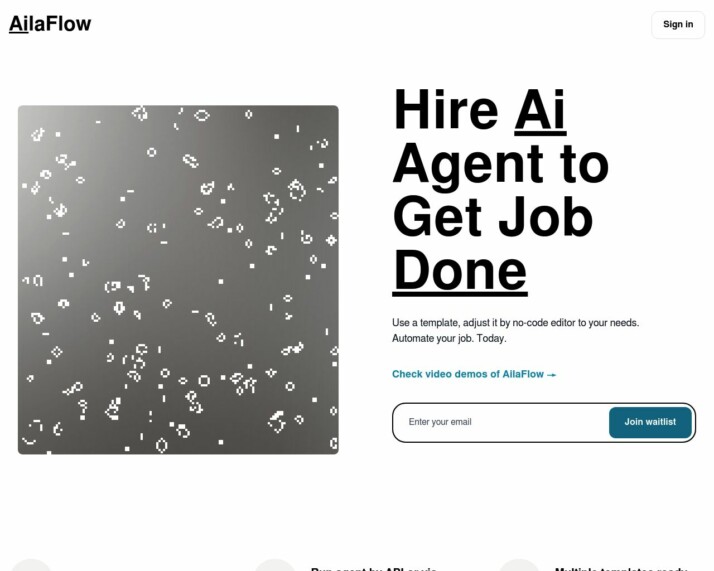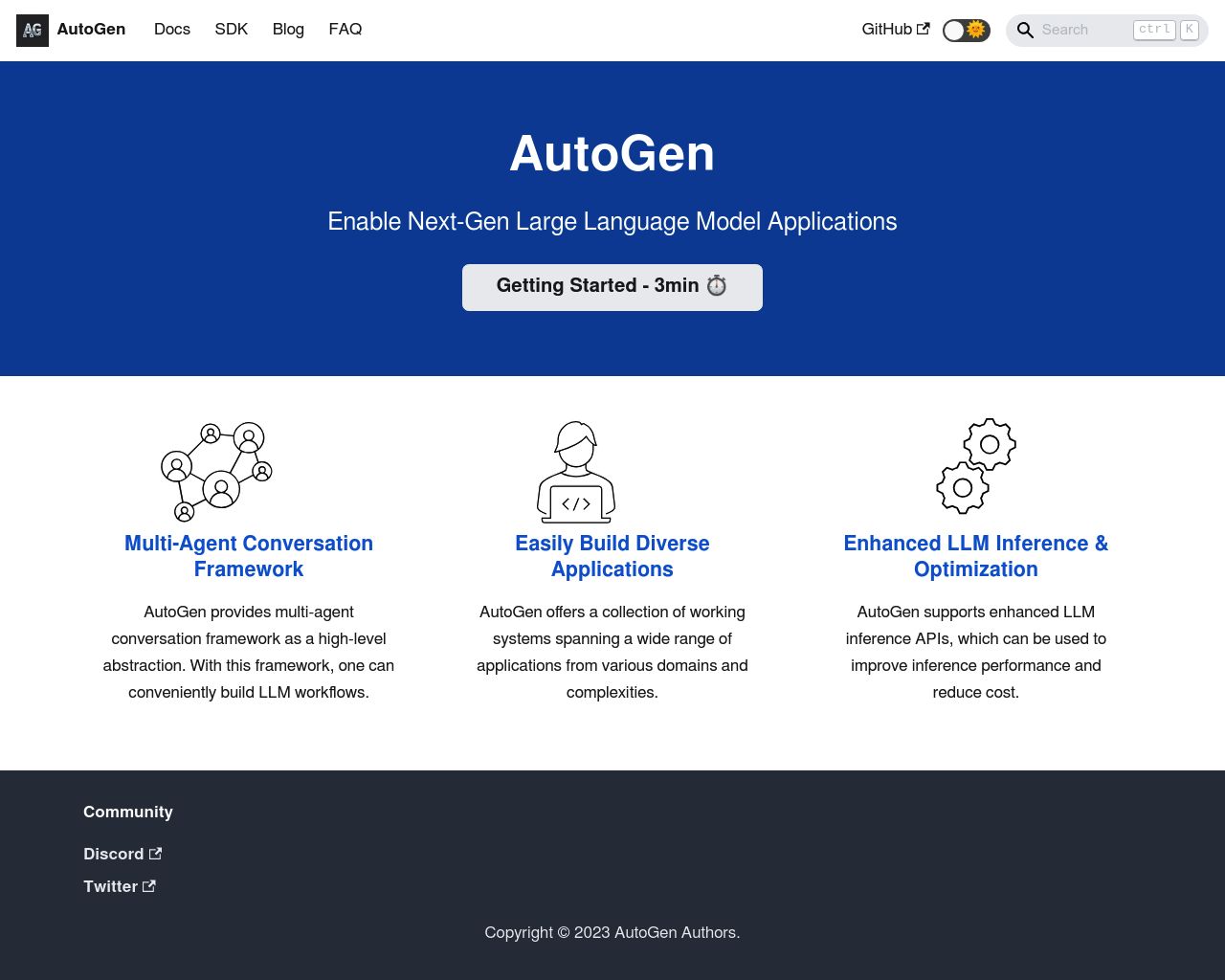A Comparison of AilaFlow and AutoGen: Which is Better for Your Automation?
AI development platforms like AilaFlow and AutoGen offer powerful tools for creating intelligent agents, but choosing the right solution can be challenging. This comparison explores the strengths and limitations of these platforms, alongside SmythOS, to help developers, business leaders, and AI enthusiasts make informed decisions. We’ll examine key features such as no-code capabilities, multi-agent systems, and advanced AI functionalities, providing insights into how each platform addresses different user needs and technical requirements. Whether you’re building enterprise-level AI solutions or exploring AI for personal projects, this guide will help you navigate the landscape of AI agent development tools.
AilaFlow Overview
AilaFlow offers a no-code platform for building AI agents, focusing on simplicity and versatility. The platform’s core feature is a sequential workflow designer, enabling users to create various applications without coding expertise.
AilaFlow offers a no-code platform for building AI agents, focusing on simplicity and versatility.


The workflow designer supports multiple frameworks like Angular, React, and Svelte, making it adaptable to different development environments. AilaFlow’s platform includes customization options such as light/dark themes and full configurability, catering to diverse user preferences.
While AilaFlow excels in providing a user-friendly interface for AI agent creation, it lacks some advanced features. The platform does not offer hosted agents, separate development and production environments, or explicit support for memory and context management. Additionally, there’s no mention of autonomous agents, explainability features, or debug modes.
AilaFlow’s vision centers on democratizing AI agent development, making it accessible to users regardless of their technical background. This approach aligns with the growing trend of no-code solutions in the AI field. However, the limited information about advanced capabilities might pose challenges for users seeking more complex AI implementations or enterprise-level solutions.
Integration capabilities and scalability details for AilaFlow remain unclear, which could be potential drawbacks for businesses looking to incorporate AI agents into existing systems or scale their operations. Despite these limitations, AilaFlow’s focus on simplicity and visual design makes it a potentially valuable tool for users new to AI agent development or those prioritizing ease of use in their projects.
AutoGen Overview
AutoGen empowers developers to build sophisticated Large Language Model (LLM) applications through multi-agent conversations. This open-source framework orchestrates interactions between customizable agents, LLMs, tools, and humans to tackle complex tasks.


AutoGen’s core strength lies in its multi-agent conversation system. Agents collaborate autonomously or with human input, adapting to diverse use cases. The framework maximizes LLM performance through enhanced inference capabilities, including tuning, caching, error handling, and templating. This optimization proves crucial when working with resource-intensive models like GPT-4.
AutoGen’s core strength lies in its multi-agent conversation system. Agents collaborate autonomously or with human input, adapting to diverse use cases.
Developers can tailor AutoGen’s conversable agents to specific tasks, integrating LLMs, human inputs, and various tools. The framework supports both fully autonomous operations and human-in-the-loop problem-solving, offering flexibility for applications requiring human oversight. AutoGen has demonstrated effectiveness across a wide range of applications, from automated task solving and code generation to continual learning and complex problem-solving in group chats.
For developers, AutoGen provides essential debugging tools, including logging functionalities for API calls. This feature aids in diagnosing and optimizing LLM-based systems. The framework also incorporates EcoOptiGen, a cost-effective technique for tuning large language models, underscoring its focus on enhancing LLM efficiency and effectiveness.
While AutoGen offers powerful capabilities for LLM-driven applications, it lacks some features found in more comprehensive platforms. The framework does not provide hosted agents, separate development and production environments, or built-in explainability tools. Additionally, AutoGen does not offer native support for multimodal inputs, autonomous agents, or human-AI interaction features. These limitations may impact its suitability for certain enterprise-level deployments or applications requiring advanced AI capabilities beyond conversational agents.
Feature Comparison
AilaFlow and AutoGen offer contrasting approaches to AI agent development. AilaFlow provides a user-friendly no-code platform with a visual workflow designer, making AI agent creation accessible to users without coding expertise. However, it lacks advanced features like hosted agents, separate development and production environments, and explicit support for memory and context management. AutoGen, on the other hand, excels in multi-agent conversations and enhancing LLM performance but doesn’t offer a visual builder or no-code options.
In terms of core components, AutoGen’s strength lies in its customizable conversable agents and support for both autonomous operations and human-in-the-loop problem-solving. AilaFlow, while user-friendly, doesn’t mention features like autonomous agents, explainability tools, or debug modes. AutoGen provides essential debugging tools and logging functionalities, which AilaFlow doesn’t explicitly offer.
Regarding security, neither platform explicitly mentions features like data encryption, OAuth, or IP control in the provided information. This gap highlights the need for users to carefully consider security requirements when choosing a platform for AI agent development.
Feature Comparison Table
| AilaFlow | AutoGen | SmythOS | |
|---|---|---|---|
| CORE FEATURES | |||
| Visual Builder | ✅ | ❌ | ✅ |
| No-Code Options | ✅ | ❌ | ✅ |
| Agent Work Scheduler | ✅ | ❌ | ✅ |
| SECURITY | |||
| Constrained Alignment | ❌ | ❌ | ✅ |
| IP Control | ❌ | ❌ | ✅ |
| COMPONENTS | |||
| Data Lakes | ❌ | ❌ | ✅ |
| DEPLOYMENT OPTIONS (EMBODIMENTS) | |||
| Staging Domains | ❌ | ❌ | ✅ |
| Production Domains | ❌ | ❌ | ✅ |
| Deploy as Scheduled Agent | ✅ | ❌ | ✅ |
| DATA LAKE SUPPORT | |||
| Hosted Vector Database | ❌ | ❌ | ✅ |
| Sitemap Crawler | ❌ | ❌ | ✅ |
| YouTube Transcript Crawler | ❌ | ❌ | ✅ |
Best Alternative to AilaFlow and AutoGen
SmythOS stands out as the superior alternative to AilaFlow and AutoGen for AI agent development and deployment. Our platform combines the best of both worlds, offering an intuitive visual builder like AilaFlow with the advanced multi-agent capabilities of AutoGen, while surpassing both in key areas.
We provide a comprehensive no-code solution that empowers users to create sophisticated AI agents without programming expertise. Our drag-and-drop interface simplifies the development process, allowing rapid prototyping and deployment of AI solutions. Unlike AilaFlow’s limited workflow designer, SmythOS offers a full-featured visual builder integrated with powerful AI models and extensive API connections.
SmythOS stands out as the superior alternative to AilaFlow and AutoGen for AI agent development and deployment… offering an intuitive visual builder like AilaFlow with the advanced multi-agent capabilities of AutoGen…
While AutoGen excels in enhancing LLM performance, SmythOS takes it further by supporting a wide array of foundation models and Hugging Face integrations. We offer seamless scalability from development to production, with dedicated environments and hosting options that neither AilaFlow nor AutoGen explicitly provide. Our platform also includes robust debugging tools, explainability features, and audit logs, addressing critical needs for transparency and performance optimization.
SmythOS distinguishes itself with unparalleled flexibility in deployment options. We support API endpoints, webhooks, scheduled agents, and even GPT integrations, allowing AI agents to be embedded across diverse digital ecosystems. This versatility, combined with our advanced security features like constrained alignment and IP control, makes SmythOS ideal for enterprise-grade applications while remaining accessible to individual developers and small teams.
SmythOS distinguishes itself with unparalleled flexibility in deployment options… allowing AI agents to be embedded across diverse digital ecosystems.
By choosing SmythOS, users gain access to a cutting-edge AI development platform that outperforms both AilaFlow and AutoGen in ease of use, feature set, and unlimited use cases. Our commitment to innovation and user empowerment makes SmythOS the clear choice for those seeking to harness the full potential of AI agents in their projects and workflows.
Conclusion
AilaFlow and AutoGen offer distinct approaches to AI agent development, each with unique strengths. AilaFlow’s no-code platform and visual workflow designer make AI accessible to non-technical users. AutoGen excels in multi-agent conversations and enhancing LLM performance, catering to developers seeking advanced capabilities.
SmythOS stands out by combining the best of both worlds. Our platform offers a user-friendly visual builder for creating AI agents without coding, while also providing powerful features like hosted agents, separate development and production environments, and robust security measures. SmythOS supports multimodal inputs, autonomous agents, and human-AI interaction, addressing limitations found in both AilaFlow and AutoGen.
For businesses and developers seeking a comprehensive AI solution, SmythOS delivers unparalleled versatility and scalability. Explore our diverse range of AI-powered agent templates to jumpstart your projects, or dive into our documentation for in-depth insights into SmythOS capabilities. Create a free SmythOS account today and experience the future of AI agent development with unlimited agents and a 30-day money-back guarantee.
Last updated:
Disclaimer: The information presented in this article is for general informational purposes only and is provided as is. While we strive to keep the content up-to-date and accurate, we make no representations or warranties of any kind, express or implied, about the completeness, accuracy, reliability, suitability, or availability of the information contained in this article.
Any reliance you place on such information is strictly at your own risk. We reserve the right to make additions, deletions, or modifications to the contents of this article at any time without prior notice.
In no event will we be liable for any loss or damage including without limitation, indirect or consequential loss or damage, or any loss or damage whatsoever arising from loss of data, profits, or any other loss not specified herein arising out of, or in connection with, the use of this article.
Despite our best efforts, this article may contain oversights, errors, or omissions. If you notice any inaccuracies or have concerns about the content, please report them through our content feedback form. Your input helps us maintain the quality and reliability of our information.
